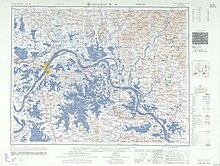Wu-ch'ang
Jump to navigation
Jump to search
English
[edit]
Etymology
[edit]From the Wade–Giles romanization of the Mandarin 武昌 (Wu³-chʻang¹).[1]
Pronunciation
[edit]- enPR: wo͞oʹchängʹ
Proper noun
[edit]Wu-ch'ang
- Alternative form of Wuchang
- 1903, Frederick Howard Taylor, These Forty Years: A Short History of the China Inland Mission[1], Pepper Publishing Company, →OCLC, page 182:
- Mr. and Mrs. Judd went forward to Wu-ch'ang, the capital of Hu-peh, and there established what they trusted would become the basis for the new western work of the China Inland Mission.Not long after, another sum of three thousand pounds was given for work in western China by donors who wished their names withheld.
As is well known, Wu-ch'ang is the chief governing city of central China, and is situated at the head of the more navigable lower Yang-tse, just opposite Han-kow, that great commercial metropolis to and from which large ocean-going steamers carry merchandise. In these two cities and the adjacent Han-yang, three cities in one, there is a total population of not less than two millions.
Wu-ch'ang is not merely the capital of Hu-peh and residence of the governor, but also the seat of the viceroy of Hu-peh and Hu-nan.
- 1932, “HUNG HSIU-CHʻÜAN”, in The Encyclopedia Americana[2], volume H, Americana Corporation, →OCLC, page 499, column 1:
- He then adopted the term "Heavenly Dynasty of Perfect Peace" (Taiping Kwoh), styling himself the Heavenly King; and working his way northward in 1853, he captured Wu-chʻang and all the other cities on the Yang-tsze down to An-chʻing, […]
- 1964, Theodore Shabad, “WU-HAN”, in Encyclopedia Britannica[3], volume 23, →OCLC, page 877, column 2:
- Wu-ch’ang, the oldest of the Wu-han cities, dates from several centuries B.C. It was capital of both the Chou (300 B.C.) and Wu (A.D. 300) kingdoms. An ancient cultural centre, it is the seat of Wu-han university and location of various commercial, industrial and art institutes, including those of medicine, agriculture and technology.
- 1971, Deborah S. Davis, “The Cultural Revolution in Wuhan”, in The Cultural Revolution in the Provinces[4], Harvard University Press, →ISBN, →LCCN, →OCLC, →OL, page 160:
- In late September, the Chan Kuang-chou (Fighting Canton) publication reported that the Million Heroes were still in business, had set up a liaison center in outlying areas of Wuhan, and were holding secret meetings in worker’s dormitories at the Wu-ch’ang shipyard.⁵¹ Obviously the rebel forces had not been subdued.
- For more quotations using this term, see Citations:Wu-ch'ang.
Translations
[edit]Wuchang — see Wuchang
References
[edit]- ^ Wuchang, Wade-Giles romanization Wu-chang, in Encyclopædia Britannica
Further reading
[edit]- “Wu-ch'ang”, in Collins English Dictionary.
- “Wu-ch'ang” in TheFreeDictionary.com, Huntingdon Valley, Pa.: Farlex, Inc., 2003–2024.